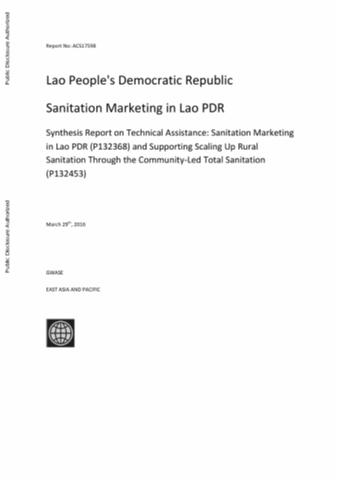The World Bank is a vital source of financial and technical assistance to developing countries around the world. We are not a bank in the ordinary sense but a unique partnership to reduce poverty and support development. The World Bank Group has two ambitious goals: End extreme poverty within a generation and boost shared prosperity.
- To end extreme poverty, the Bank's goal is to decrease the percentage of people living on less than $1.25 a day to no more than 3% by 2030.
- To promote shared prosperity, the goal is to promote income growth of the bottom 40% of the population in each country.
The World Bank Group comprises five institutions managed by their member countries.
The World Bank Group and Land: Working to protect the rights of existing land users and to help secure benefits for smallholder farmers
The World Bank (IBRD and IDA) interacts primarily with governments to increase agricultural productivity, strengthen land tenure policies and improve land governance. More than 90% of the World Bank’s agriculture portfolio focuses on the productivity and access to markets by small holder farmers. Ten percent of our projects focus on the governance of land tenure.
Similarly, investments by the International Finance Corporation (IFC), the World Bank Group’s private sector arm, including those in larger scale enterprises, overwhelmingly support smallholder farmers through improved access to finance, inputs and markets, and as direct suppliers. IFC invests in environmentally and socially sustainable private enterprises in all parts of the value chain (inputs such as irrigation and fertilizers, primary production, processing, transport and storage, traders, and risk management facilities including weather/crop insurance, warehouse financing, etc
For more information, visit the World Bank Group and land and food security (https://www.worldbank.org/en/topic/agriculture/brief/land-and-food-security1
Resources
Displaying 446 - 450 of 4907Sanitation Marketing in Lao People's Democratic Republic
This report summarizes the results, lessons and recommendations to the Government of Lao PDR from two Technical Assistance projects (TA) “Supporting Demand Creation for Sanitation through Community Led Total Sanitation” and “Sanitation Marketing in Lao PDR” carried out by the World Bank’s Water and Sanitation Program between October 2012 and December 2015. The development objective of the TAs was to increase improved sanitation and hygiene practices and change community behavior to achieve Open Defecation Free (ODF) status at the village level.
System of Environmental-Economic Accounting 2012
Ecosystem accounting is a coherent and integrated approach to the assessment of
Systematic Country Diagnostic for the Eight Small Pacific Island Countries
This Systematic Country Diagnostic (SCD)
covers eight small Pacific island countries (PIC8):
Kiribati, Marshall Islands, the Federated States of
Micronesia, Palau, Samoa, Tonga, Tuvalu, and Vanuatu. The
objective of the SCD is to identify the most critical
constraints and opportunities facing the PIC8 to meet the
global goals of ending absolute poverty and boosting shared
prosperity in a sustainable manner. The report is intended
Afghanistan Systematic Country Diagnostic
Afghanistan is a deeply fragile and
conflict affected state. It has been in almost constant
conflict for over 35 years since the Soviet invasion of
1979. Today the country is at a crossroads in its
development with economic growth down sharply and poverty
incidence stubbornly high. Afghanistan faces tremendous
development challenges. Gross domestic product (GDP)
per-capita is among the lowest in the world, poverty is deep
On the Engagement of Excluded Groups in Inclusive Cities
The term “inclusive cities” is
increasingly being used as a “catch-all” phrase to signify
intent but with little precision in its use. In this note we
use “inclusive cities” to mean cities in which we see a
commitment to an inclusive politics with the establishment
of institutionalized interactions between organized groups
of disadvantaged citizens and the state with local
government taking a primary role. They are also cities in







